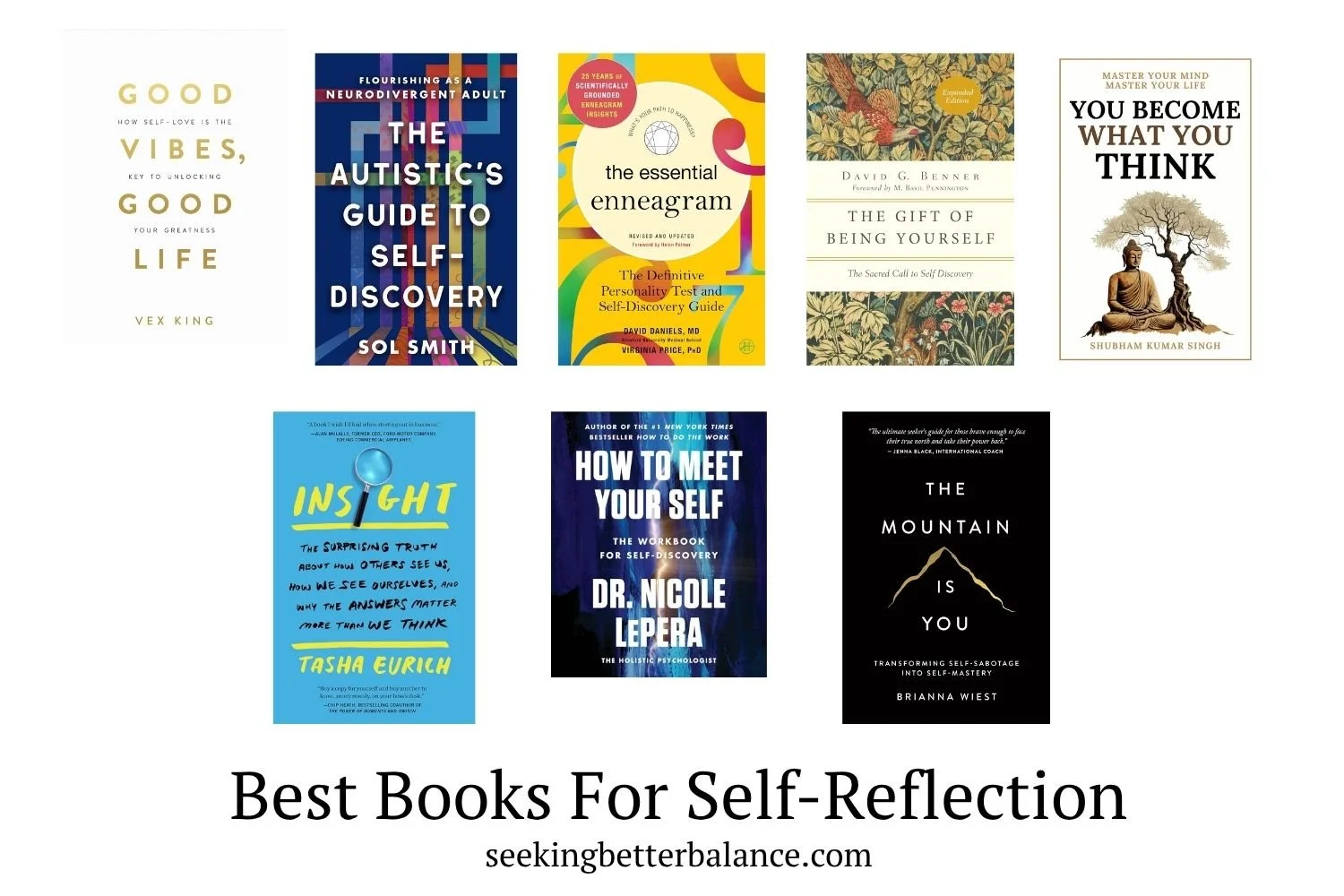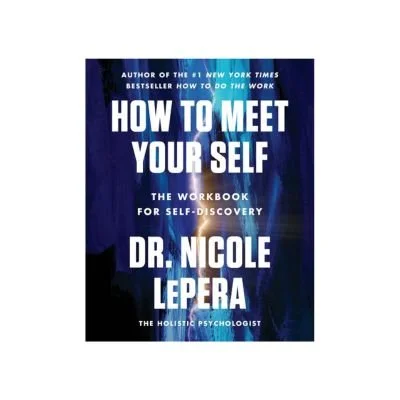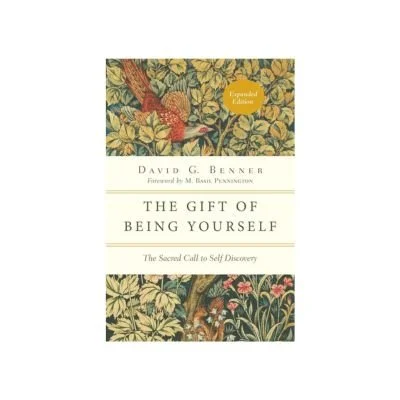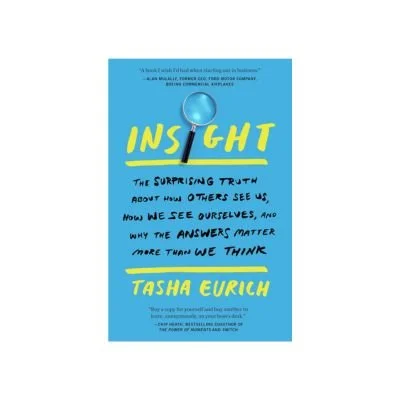Best Books on Self-Discovery & Reflection
If you’re hunting for a journal prompts book that doesn’t feel preachy or fluffy, you’re in the right place. These are the titles we reach for when life gets noisy and we want better questions, not louder advice. Each pick includes simple prompts, short exercises, or thought frameworks you can use right away—no perfect routine required. Skim the Quick Picks table up top to find your lane, then jump to the mini-review for context before you click out to Amazon.
For more tools after you choose a book: the Self-Reflection & Personal Insight hub collects all our worksheets, and the Strengths Mapping & Values Inventory walkthrough pairs perfectly with any title here. If you like a calmer brain while you read, check out our Best Books on Meditation list.
Quick Picks: Best Self-Reflection Books
| Best For | Pick | Why It Works |
|---|---|---|
| Starting your inner work | How to Meet Yourself | Short, gentle prompts and exercises that make reflection feel doable. |
| Identity, purpose, and spirituality | The Gift of Being Yourself | Guided questions that look beneath roles and expectations to the real you. |
| Neurodivergent self-understanding | The Autistic’s Guide to Self-Discovery | Clear frameworks and prompts to map strengths, needs, and boundaries. |
| Quick self-typing + reflection | The Essential Enneagram | Concise assessment plus type-specific questions for growth. |
| Transforming self-sabotage | The Mountain Is You | Prompts and reflections that help you name and shift blocking habits. |
| Mindset and daily habits | Good Vibes, Good Life | Bite-size ideas with simple journal questions you can use right away. |
| Evidence-based self-awareness | Insight | Research-backed practices and reflection prompts to spot blind spots. |
| Simple, repeatable mental models | You Become What You Think | Short, repeatable prompts that reframe choices and thinking. |
The Best Self-Discovery Books List
1. How to Meet Yourself
If you’re just dipping a toe into reflection, this is a gentle on-ramp. The chapters are short, the prompts are friendly, and the whole thing feels more like a conversation than homework. You’ll start spotting patterns and values without getting stuck in overthinking. Try this tonight: finish the sentence “I feel most like myself when…” three different ways. For a next step, try Strengths Mapping & Values Inventory.
Check price on Amazon
2. The Gift of Being Yourself
This one invites you to look underneath the roles and expectations and meet the person who’s actually there—You! The questions are steady and honest—no performance required. A great read for when you’re sorting out your purpose and identity simultaneously. Ask, “Where am I performing instead of being?” and see what shifts. For more, visit: Self-Reflection & Personal Insight.
3. The Autistic’s Guide to Self-Discovery
Clear frameworks, validating language, and practical check-ins make this a strong map for neurodivergent self-understanding. You’ll translate self-knowledge into supports that actually help—sensory, communication, energy. Start by listing three environments where you thrive and note why each one works. For a structured follow-up, see Strengths Mapping & Values Inventory.
Check price on Amazon
4. The Essential Enneagram
Quick to read, surprisingly useful in practice. You get a concise assessment plus type guides with real-life experiments instead of theory for theory’s sake. After you land on a type, jot three “When I’m stressed, I tend to…” patterns—and then sketch one kinder alternative for each. For a grounding companion, browse Best Books on Meditation.
5. The Mountain Is You
If self-sabotage keeps popping up with different costumes, this helps you name it and trade it for something kinder and sturdier. It connects emotions to choices so change feels doable, not dramatic. Try identifying one protective habit that’s outlived its job, then write the replacement you’ll practice this week. For quick writing prompts, visit Journaling for Clarity.
6. Good Vibes, Good Life
Light, approachable, and easy to use when your schedule’s already packed. The short chapters pair well with micro-habits you can run for a week at a time. Pick one tiny practice, track it for seven days, and notice how your mood and choices shift. For more bite-size ideas, explore Self-Reflection & Personal Insight.
7. Insight
Research-backed, practical, and very down to earth about blind spots. It gives you tools to see yourself more clearly—and to understand how others experience you. Keep a nightly one-liner: “What did I learn about me today?” and watch the dots start connecting. For a structured next step, try Strengths Mapping & Values Inventory.
8. You Become What You Think
Short, repeatable mental models you can test when time is tight. It’s less “reinvent your life” and more “tweak the dial and see what changes.” Write one simple rule—“When X happens, then I will Y”—and run it for a week. For a simple writing anchor, see Journaling for Clarity.
Check price on Amazon
How to choose your next read
Goal: Clarity, identity work, or habit change? Pick the lane first.
Energy: Do you want short chapters or a deeper workbook vibe?
Support: Would a framework help (Enneagram, structured prompts), or do you prefer looser reflection?
Whichever you choose, pair the book with one tiny practice—a nightly sentence, a weekly retro, or a values check-in. The book opens the door; the practice makes it yours. And if you need extra nudge, keep a journal prompts book on your nightstand and let one question lead you to the next page.
Ready to keep the momentum? If you want simple, real-world exercises, wander through the Self-Reflection & Personal Insight hub and try Strengths Mapping & Values Inventory or a quick Journaling for Clarity reset.
And if you like a nudge in your inbox, join the 5-Day Self-Reflection Reset challenge—short daily prompts, zero fluff, real insight.









